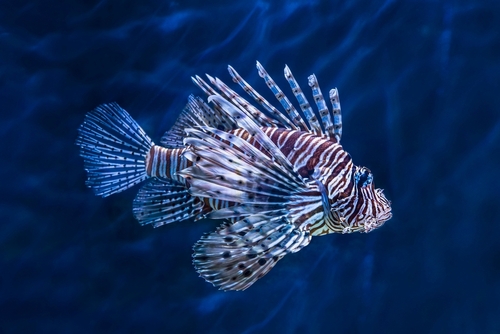Even though keeping a saltwater aquarium at home is a lot more work and considerably more involved than a freshwater set up, the fish that you are able to add to this kind of underwater world are almost always well worth the extra effort.
Lionfish in particular are a hugely popular option with saltwater aquarium enthusiasts for a couple of different reasons.
Native to the waters throughout the Indo Pacific region (as well as in the Atlantic Ocean, Caribbean ocean, and even the Red Sea), these fish have a completely unique look and vibrant colors that’ll make your aquarium “must see” for sure.
These fish are sometimes challenging to source (online is your best bet), and can even go beyond this more expensive side of things – with average lionfish coming in at anywhere between $20 and $100. The rarer (and more popular) species of lionfish like the fuzzy dwarf lionfish and the zebra lionfish – are going to be priced near the top end of that range.
Now, to be fair, lionfish aren’t exactly ideally suited for brand-new aquarium owners – for no other reason than the fact that they can be venomous and will deliver painful stings if they aren’t handled with care.
On top of that, these fish have a tendency to sometimes get a little aggressive, particularly if they are feeling stressed out. You’re going to want to be sure you understand exactly what you’re getting into with these fish.
Luckily, though, armed with the inside information below you’ll be able to better care for lionfish and fill out your aquarium with a bunch of lionfish tank mates that all get along well with one another.
Let’s get right into it.
Contents
What to Know About Lionfish
Beloved throughout the saltwater aquarium community, these fish are gorgeous, striking, and incredibly graceful – but also have the ability to be tremendous hunters and even a little bit on the more aggressive side of things if they get stressed out.
Considered an invasive species in many parts of the world, these fish can be a lot of fun to keep at home (away from “wild” waters) but you want to be sure that you are adding them to aquarium communities that have really been well-thought-out.
These aren’t the kind of fish you can just drop into any tank with any other species of fish and not have to worry about any trouble brewing.
Temperament
99.99% of the time you are going to find lionfish to be peaceful, docile, and even borderline solitary underwater creatures.
Every now and again, though, these fish can get there dander up and become pretty aggressive and pretty territorial. This usually happens when they start to feel a squeeze as far as food supply is concerned, are starting to get crowded out by too many other fish in the tank, or are put in aquariums with other particularly aggressive species of fish.
Avoid those triggers as much as you can and you’ll never have to worry about the temperament of your lionfish.
Average Size
There are some pretty big lionfish out there in the wild (and more than a few in captivity) – we are talking about lionfish that grow to be 18 inches in length or longer – but the majority of these fish are considerably shorter than that.
As a general rule of thumb that these fish are going to grow to between 6 and 10 inches long at full maturity.
Competition
When they are in the wild lionfish are the undisputed top-tier, apex predator underwater and have very few natural enemies whatsoever.
In home aquariums setups, though, these fish generally try to keep to themselves and lead as peaceful a life as possible (provided they have enough water all by themselves).
Competition can ramp up between lionfish and other species in your aquarium, though. Competition usually kicks off if food is scarce, water starts to get crowded, or a lot of unruly fish are added to the tank that lionfish have already adapted to.
Water Parameters ; Tank Setup
Described as a pretty hardy fish through and through, lionfish are highly adaptable to a variety of different water conditions but definitely have a range of temperatures and pH balances that they enjoy.
Do your level best to keep these fish in warm saltwater held at a temperature of between 75° and 80°F. PH levels that hover somewhere in the middle of 8.1 and 8.4 will keep these fish really happy, too.
Make sure that you give your lionfish plenty of structure and spots to hide in when filling out the tank. Little caves, lots of plant life, and driftwood that they can zip into and out of will make them a lot happier.
As far as tank size is concerned, a single lionfish should have at least 50 gallons of water to move around in all on their own. Each additional fish added to the tank should have an extra 20 gallons to themselves, too.
15 Best Lionfish Tank Mates
Also, don’t miss on our other favorite posts in this category:
1. Groupers
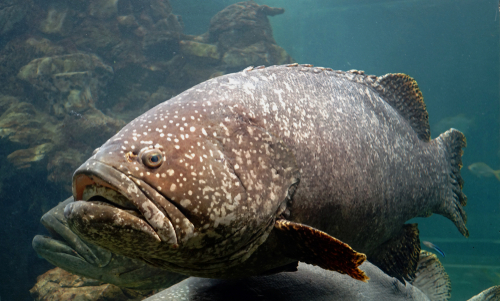
- Scientific Name: Epinephelinae
- Average Adult Size: Varies depending on the species, but can range from 10 to 60 inches
- Level of Care: Moderate to hard
- Place of Origin: Various locations worldwide, including the Atlantic, Indian, and Pacific Oceans
- Compatible with: Triggerfish, Pufferfish, Rabbitfish
A fantastic companion fish for your lionfish tank, these underwater creatures are large enough and strong enough to withstand any lionfish “attacks” and then keep the peace afterwards.
Pros of keeping with lionfish
- Groupers are larger fish that can hold their own against lionfish. They are also slower moving and not likely to provoke the lionfish.
Cons of keeping with lionfish
- Groupers may harm the lionfish if they act aggressive.
2. Angelfish
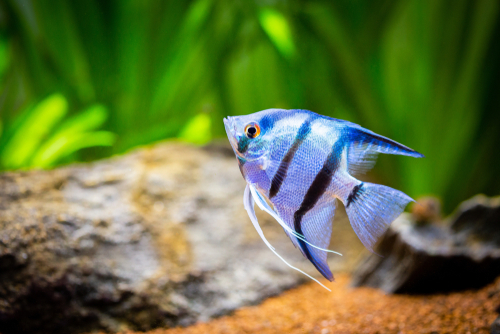
- Scientific Name: Pterophyllum spp.
- Average Adult Size: 4-10 inches
- Level of Care: Moderate
- Place of Origin: South America
- Compatible with: Tangs, Damsels, Corals
Very peaceful and relaxed fish, so long as your angelfish are about the same size as your lionfish you’ll never have any trouble with temperament or competition issues.
Pros of keeping with lionfish
- Angelfish are pretty peaceful and not apt to provoke the lionfish.
Cons of keeping with lionfish
- Angelfish may nip at the lionfish’s fins, which could cause stress or injury
3. Tangs
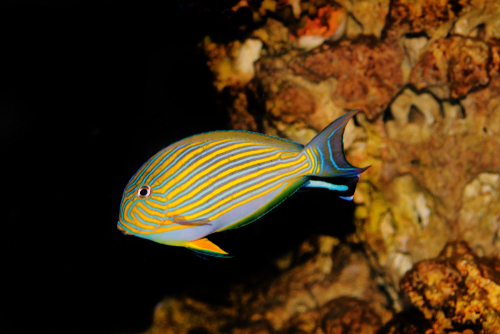
- Scientific Name: Acanthuridae
- Average Adult Size: Varies depending on the species, but can range from 5 to 15 inches
- Level of Care: Easy to moderate
- Place of Origin: Various locations worldwide, including the Atlantic, Indian, and Pacific Oceans
- Compatible with: Angelfish, Rabbitfish, Gobies
One of the reasons you’ll want to consider adding these fish into your lionfish aquarium is because of their speed. They can zip away from any lionfish that gets a little prickly.
Pros of keeping with lionfish
- Tangs are generally fast-moving fish that are not apt to be targeted by the lionfish.
Cons of keeping with lionfish
- Tangs can get aggressive with lionfish and may potentially harm them.
4. Triggerfish
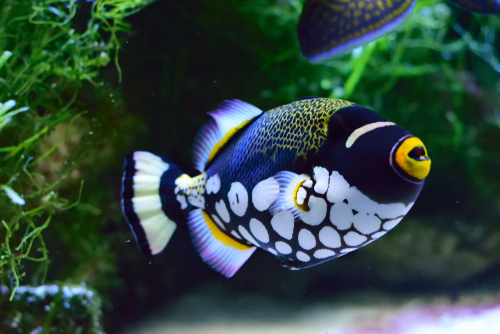
- Scientific Name: Balistidae
- Average Adult Size: Varies depending on the species, but can range from 8 to 24 inches
- Level of Care: Moderate
- Place of Origin: Various locations worldwide, including the Atlantic, Indian, and Pacific Oceans
- Compatible with: Groupers, Snappers, Filefish
Large, confident, and capable of holding their own if a lionfish gets a bit competitive or territorial, these fish are generally pretty peaceful and can help sort of regulate the atmosphere in your underwater world.
Pros of keeping with lionfish
- Triggerfish are not very likely to be targeted or bullied by lionfish.
Cons of keeping with lionfish
- Triggerfish may become aggressive towards the lionfish if they become aggressive towards the triggerfish.
5. Pufferfish
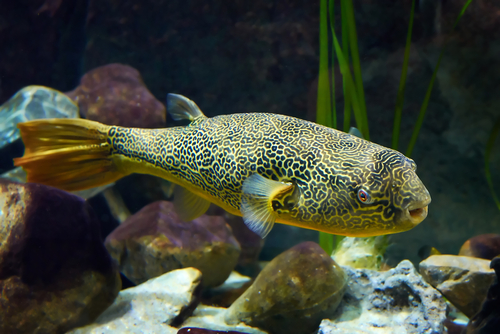
- Scientific Name: Tetraodontidae
- Average Adult Size: Varies depending on the species, but can range from 2 to 24 inches
- Level of Care: Moderate to hard
- Place of Origin: Various locations worldwide, including the Atlantic, Indian, and Pacific Oceans
- Compatible with: Groupers, Triggerfish, Rabbitfish
The tough, spiky, almost hardened shell exterior of these fish armor them against any lionfish attacks. You won’t have to worry about them getting into scuffles with your lionfish.
Pros of keeping with lionfish
- Pufferfish are hardy and capable of protecting themselves
Cons of keeping with lionfish
- They are too large for the lionfish to eat, which might cause those fish to become aggressive.
6. Snappers
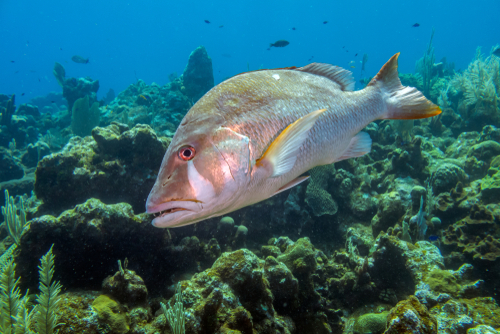
- Scientific Name: Lutjanidae
- Average Adult Size: Varies depending on the species, but can range from 8 to 36 inches
- Level of Care: Moderate
- Place of Origin: Various locations worldwide, including the Atlantic, Indian, and Pacific Oceans
- Compatible with: Groupers, Triggerfish, Filefish
Large (sometimes considerably larger than the lionfish they are kept with), these fish are relaxed, peaceful, and easy-going. Their size keeps lionfish from getting too big for their britches.
Pros of keeping with lionfish
- Snappers are larger fish that can fight back against lionfish. They won’t be bullied.
Cons of keeping with lionfish
- Snappers may prey on smaller fish in the aquarium.
7. Hawkfish
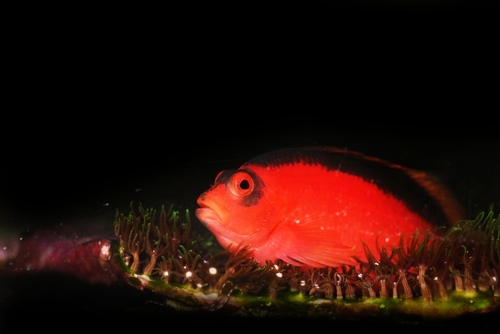
- Scientific Name: Cirrhitidae
- Average Adult Size: Varies depending on the species, but can range from 2 to 6 inches
- Level of Care: Easy
- Place of Origin: Various locations worldwide, including the Atlantic, Indian, and Pacific Oceans
- Compatible with: Groupers, Angelfish, Blennies
The best reason to keep these fish with your lionfish is because they enjoy the same kind of water conditions and share similar temperaments, helping to keep one another in check.
Pros of keeping with lionfish
- Hawkfish are peaceful and hardy fish that can protect themselves from lionfish.
Cons of keeping with lionfish
- Hawkfish are sometimes territorial and could harm lionfish when they feel threatened.
8. Filefish
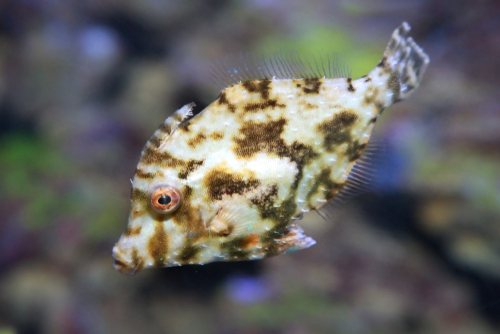
- Scientific Name: Monacanthidae
- Average Adult Size: Varies depending on the species, but can range from 3 to 20 inches
- Level of Care: Easy to moderate
- Place of Origin: Various locations worldwide, including the Atlantic, Indian, and Pacific Oceans
- Compatible with: Triggerfish, Snappers, Gobies
You won’t ever have to worry about these fish becoming victims to lionfish that go on a rampage. Tough and peaceful, they won’t let the bullying of lionfish ruin their day.
Pros of keeping with lionfish
- Filefish are pretty calm and peaceful. They also cut down on algae in your tank.
Cons of keeping with lionfish
- Filefish may be too small and active for lionfish to feel comfortable, something that can lead to lionfish becoming stressed or frustrated.
9. Rabbitfish
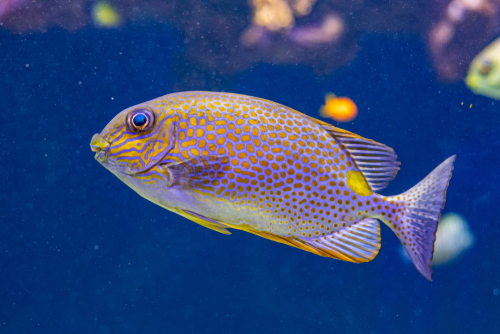
- Scientific Name: Siganidae
- Average Adult Size: Varies depending on the species, but can range from 6 to 12 inches
- Level of Care: Easy to moderate
- Place of Origin: Various locations worldwide, including the Atlantic, Indian, and Pacific Oceans
- Compatible with: Groupers, Pufferfish, Tangs
Like puffer fish, these fish have a spiky and tough (almost armored) exterior that protects them from more aggressive fish. They love the same kind of water conditions that lionfish thrive in.
Pros of keeping with lionfish
- Rabbitfish are super peaceful and relaxed. They do a good job with controlling algae in the tank.
Cons of keeping with lionfish
- Rabbitfish can cause lionfish to become agitated and aggressive.
10. Damsels
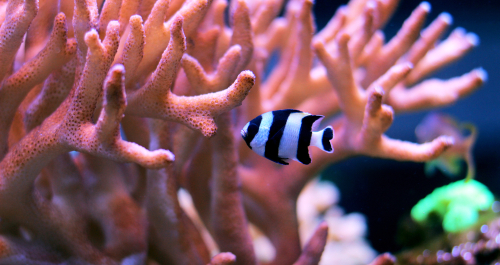
- Scientific Name: Pomacentridae
- Average Adult Size: Varies depending on the species, but can range from 2 to 6 inches
- Level of Care: Easy
- Place of Origin: Various locations worldwide, including the Atlantic, Indian, and Pacific Oceans
- Compatible with: Angelfish, Wrasses, Corals
These fish are absolutely beautiful and lightning fast, which means your tank is going to be filled with a lot of personality and a lot of energy – but you won’t have to worry about your lionfish catching these damsels and causing them any headache, either.
Pros of keeping with lionfish
- Damsels are generally hardy and strong fish that won’t be bullied by lionfish.
Cons of keeping with lionfish
- Damsels can sometimes become aggressive towards your lionfish.
11. Blennies
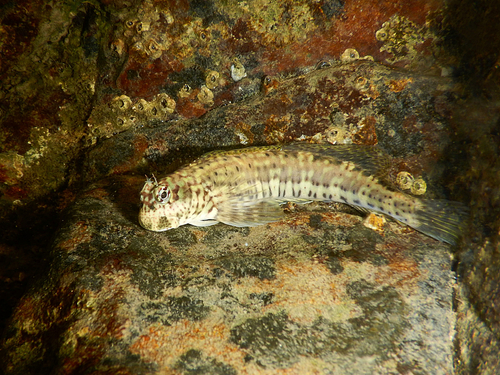
- Scientific Name: Blenniidae
- Average Adult Size: Varies depending on the species, but can range from 2 to 6 inches
- Level of Care: Easy
- Place of Origin: Various locations worldwide, including the Atlantic, Indian, and Pacific Oceans
- Compatible with: Gobies, Hawkfish, Corals
Relatively small and super docile, these fish aren’t going to trigger the competitive or territorial aspects of lionfish even just a little bit.
Pros of keeping with lionfish
- Blennies are a super peaceful fish that aren’t going to make waves in your underwater world
Cons of keeping with lionfish
- Blennies and their constant motion and movement can cause your lionfish to become a little stressed out.
12. Wrasses
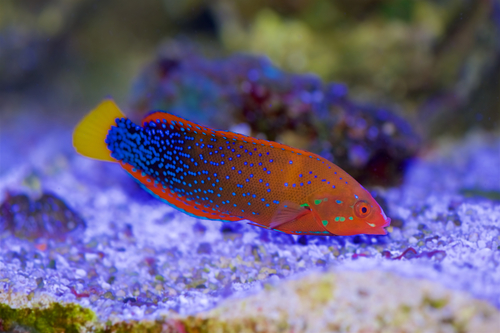
- Scientific Name: Labridae
- Average Adult Size: Varies depending on the species, but can range from 2 to 20 inches
- Level of Care: Easy to moderate
- Place of Origin: Various locations worldwide, including the Atlantic, Indian, and Pacific Oceans
- Compatible with: Angelfish, Rabbitfish, Damsels
Fast swimming and agile, these fish move a lot quicker than they might appear to be able to (because of their size) which helps them get away from lionfish that are starting to feel territorial.
Pros of keeping with lionfish
- Wrasses are generally fast-moving fish that are not going to be hassled by lionfish. They also do a wonderful job at helping to keep parasite populations lower in the tank.
Cons of keeping with lionfish
- Some wrasses have a tendency to get worked up, and what that happens they might pick fights with your lionfish
13. Gobies
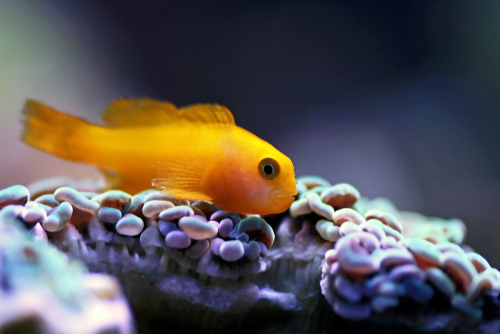
- Scientific Name: Gobiidae
- Average Adult Size: Varies depending on the species, but can range from 1 to 4 inches
- Level of Care: Easy
- Place of Origin: Various locations worldwide, including the Atlantic, Indian, and Pacific Oceans
- Compatible with: Rabbitfish, Filefish, Tangs
Small, peace loving, and as friendly a fish as you’ll find in the saltwater world, there’s no reason to think that these fish would cause fights with your lionfish. They’ll be the best of friends!
Pros of keeping with lionfish
- Gobies are very friendly, calm, and peaceful fish.
Cons of keeping with lionfish
- Gobies will sometimes get stressed out themselves, and that’s when they might become aggressive towards your lionfish population.
14. Corals
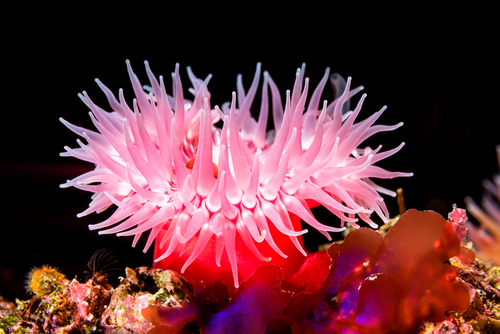
- Scientific Name: Anthozoa
- Average Adult Size: Varies depending on the species, but can range from 1 to 24 inches
- Level of Care: Moderate to hard
- Place of Origin: Various locations worldwide, including the Atlantic, Indian, and Pacific Oceans
- Compatible with: Angelfish, Damsels, Blennies
While not technically a “fish”, corals make fantastic tank mates for your lionfish – especially if you go the non-stinging route.
Pros of keeping with lionfish
- Corals are not ever going to cause harm or trouble to your lionfish population
Cons of keeping with lionfish
- If your lionfish are not well-fed, they can be tempted to nip at the corals and break them apart.
15. Peppermint Shrimp
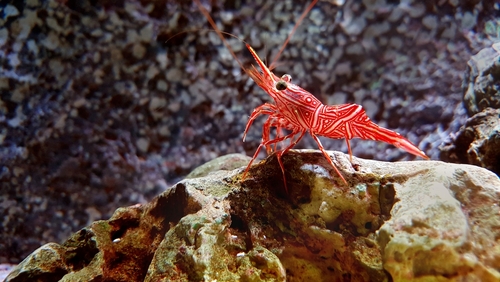
- Scientific Name: Lysmata wurdemanni
- Average Adult Size: 1 to 2 inches
- Level of Care: Easy
- Place of Origin: Caribbean
- Compatible with: Groupers, Snappers, Triggerfish
Peppermint shrimp won’t just add an interesting twist to your aquarium population (they aren’t exactly fish), but will also work double overtime to keep your tank clean and your water healthy, too.
Pros of keeping with lionfish
- Peppermint shrimp are always able to easily coexist in the same tank
Cons of keeping with lionfish
- You only have to worry about trouble if the shrimp are tiny. That’s when they might get eaten by the lionfish.
Summary
And there you have it, a quick breakdown of what we think are the top 15 best companion fish for your lionfish aquarium.
Truth be told, it’s tough to go wrong with any of the fish that we highlighted above.
All of them have their own distinct personalities. All of them have their own benefits (and even a couple of drawbacks). You want to do your research and due diligence to find the right fit for your lionfish aquarium but also for the level of effort you’re looking to put into maintaining your saltwater aquarium.
Best of luck going forward!
Frequently Asked Questions
What do lionfish eat, and how often should they be fed?
Lionfish are legendary for their ravenous appetite. As carnivores, they love to gobble up meaty foods (like krill, fish, and shrimp) that are either alive or frozen. Feed them at least once a day.
What is the ideal water temperature for lionfish, and what are the water parameters they require?
Perfect water temperatures for lionfish sit somewhere between 75°F and 80°F. Do your best to keep pH levels in the middle of 8.1 and 8.4, too. Try to keep the salinity of your tank somewhere in between 1.020 and 1.025 and you’ll have nothing to worry about.
Can lionfish live in a reef tank with other fish and corals?
Yes, lionfish are fantastic “reef tank” occupants and can live with all different kinds of fish and corals. You do have to be a little bit about the tank companions you add – which is why we put together that list shared above.
Do lionfish require any special tank setup?
Your lionfish are going to be happiest with a tank that has been intelligently set up, holds consistent water conditions, and has lots of structure, caves, plants, and dim lighting. A sandy substrate helps, too.
How often should the tank water be changed, and what is the recommended percentage?
Your lionfish will be happiest and healthiest if you swap out between 10% and 20% of the water volume every 2 to 4 weeks consistently.

Ian Sterling, founder of Fishlab.com, began his aquarium journey over 30 years ago, driven by a deep fascination for fish and their diverse personalities. His website, Fishlab.com, is dedicated to making fishkeeping accessible and enjoyable, offering beginner-friendly guidance, expert insights, and a community for aquarists to connect and share experiences.


